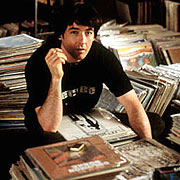Paul Moravec, my operatic collaborator, sent me this excerpt from Julian Barnes’ Levels of Life, in which Barnes describes what happened to him after his wife died:
I fell into a love of opera. For most of my life it had seemed one of the least comprehensible art forms. I didn’t really understand what was going on…but most of all, I couldn’t make the necessary imaginative leap. Operas felt like deeply implausible and badly constructed plays, with characters yelling in one another’s faces simultaneously…Now it seemed quite natural for people to stand onstage and sing at one another, because song was a more primal means of communication than the spoken word–both higher and deeper…an art in which violent, overwhelming, hysterical and destructive emotion was the norm; an art which seeks, more obviously than any other form, to break your heart. Here was my new social realism.
What fascinates me about this passage is that I find it utterly alien to my own experience–though not for the reason that you may suspect. The truth is that opera has always seemed real and natural to me. I’m not an emotionally extravagant person by any means, but even so, there was never a time in my life when I had a problem with the notion that people might sing to one another on stage, or that it’s “realistic” to expect to have your heart broken by life.
 No doubt this has something to do with the fact that I became a musician right around the time that I entered puberty, and that I’d been listening closely and attentively to pop music long before that. While I didn’t hear my first opera, La Bohème, until I was in high school, I was already well prepared for its emotional content by my previous experience of pop music.
No doubt this has something to do with the fact that I became a musician right around the time that I entered puberty, and that I’d been listening closely and attentively to pop music long before that. While I didn’t hear my first opera, La Bohème, until I was in high school, I was already well prepared for its emotional content by my previous experience of pop music.
As Nick Hornby famously put it in High Fidelity:
What came first–the music or the misery? Did I listen to music because I was miserable? Or was I miserable because I listened to music?…The unhappiest people I know, romantically speaking, are the ones who like pop music the most; and I don’t know whether pop music has caused this unhappiness, but I do know that they’ve been listening to the sad songs longer than they’ve been living the unhappy lives.
This is both clever and, up to a point, valid. On the other hand, I discovered as I grew older that both pop music and opera do in fact portray the pains and pleasures of love in a heightened but nonetheless recognizably real way. The key difference between the two art forms is that opera embeds this heightened mode of expression in a theatrical framework. Beyond that, though, I’m not so sure that there’s much of a difference between what Frank Sinatra was doing when he sang “One for My Baby” and what Maria Callas was doing when she sang “Vissi d’arte.”
Now that I’m in the business of helping to create new operas, I feel that an indispensable part of my job is figuring out how to get this point across to contemporary listeners who suffer from the mistaken notion that opera is somehow “irrelevant” to them. Unless you have no inner life at all–unless you have no notion of what it feels like to have your heart broken by love or loss or treachery–it couldn’t be more relevant. All you have to do is open your eyes and ears and be fully present in the moment, and what you see and hear on stage will make the most powerful kind of sense imaginable, in exactly the same way that a Shakespeare play can make perfect sense to a viewer who doesn’t fully understand the language that the actors are speaking.
How to persuade the stubborn skeptic that this is so? That’s not a question to be answered in a sentence or two. But Julian Barnes points the way.
